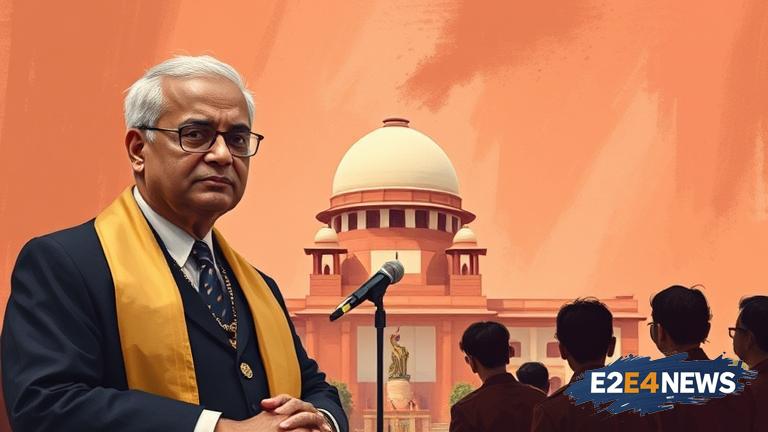In a surprising move, Justice Nagarathna has dissented on the elevation of Justice Pancholi to the Supreme Court, sparking debate over the collegium’s decision-making process. The collegium, comprising the Chief Justice of India and other senior judges, had recommended Justice Pancholi’s name for elevation to the apex court. However, Justice Nagarathna, a member of the collegium, has expressed her disagreement with the decision, citing concerns over seniority and merit. According to sources, Justice Nagarathna had raised objections to Justice Pancholi’s elevation, arguing that other senior judges were more deserving of the position. The dissent has raised eyebrows, with many questioning the collegium’s transparency and accountability. The elevation of judges to the Supreme Court is a critical process, with far-reaching implications for the judiciary and the country. The collegium’s decision-making process has been criticized in the past for being opaque and biased towards certain individuals. Justice Nagarathna’s dissent has brought to the fore the need for greater transparency and accountability in the collegium’s decision-making process. The issue has also sparked a debate over the role of seniority and merit in the elevation of judges. While some argue that seniority should be the primary consideration, others believe that merit and performance should be given greater weightage. The collegium’s decision to elevate Justice Pancholi has been seen as a surprise by many, given that other senior judges were considered more deserving of the position. The dissent has also raised questions over the collegium’s ability to make impartial decisions, with some arguing that personal biases and preferences may have played a role in the decision-making process. The Supreme Court has been at the center of several controversies in recent years, with issues ranging from judicial appointments to the handling of sensitive cases. The collegium’s decision-making process has been criticized for being slow and opaque, with many arguing that it is in need of reform. The elevation of judges to the Supreme Court is a critical process that requires careful consideration and transparency. The collegium’s decision to elevate Justice Pancholi has been seen as a test of its ability to make impartial decisions, with many watching to see how the situation unfolds. The dissent has also sparked a debate over the role of the judiciary in the country, with some arguing that it is in need of reform. The issue has also raised questions over the relationship between the judiciary and the executive, with some arguing that the executive has too much influence over the judiciary. The collegium’s decision-making process has been criticized for being vulnerable to external influences, with some arguing that it is in need of greater insulation from political pressures. The elevation of judges to the Supreme Court is a critical process that requires careful consideration and transparency, with the collegium’s decision-making process being subject to scrutiny and debate. The dissent has also raised questions over the collegium’s ability to make decisions that are in the best interests of the judiciary and the country. The issue has sparked a debate over the need for greater transparency and accountability in the collegium’s decision-making process, with many arguing that it is essential for maintaining the integrity of the judiciary. The collegium’s decision to elevate Justice Pancholi has been seen as a surprise by many, given that other senior judges were considered more deserving of the position. The dissent has also raised questions over the collegium’s ability to make impartial decisions, with some arguing that personal biases and preferences may have played a role in the decision-making process. The Supreme Court has been at the center of several controversies in recent years, with issues ranging from judicial appointments to the handling of sensitive cases. The collegium’s decision-making process has been criticized for being slow and opaque, with many arguing that it is in need of reform. The elevation of judges to the Supreme Court is a critical process that requires careful consideration and transparency, with the collegium’s decision-making process being subject to scrutiny and debate.
